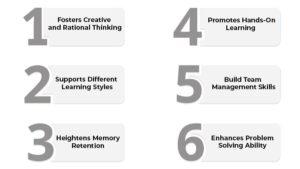Explore Courses
Top University

Aayushi
18 September, 2023
Table of Contents
“One of the major advantages of project work is that it makes school more like real life. It’s an in-depth investigation of a real-world topic worthy of children’s attention and effort.” – Sylvia Chard, an education researcher
Decades back, when we were kids, our parents and teachers emphasised getting good grades in academics and told us to stick our heads to books. I remember revising the class lessons by continuously walking around my room and reciting the topics. That is how we were trained to learn. This old learning model had little focus on solving real-world problems, which I realised while working at my first job.
These days, you might have come across the word ‘project-based learning’ while searching for any college or university. Fortunately, the new teaching pedagogy has incorporated the pattern of developing skills for living in a knowledge-based, technological society. And that is why you hear and see project-based learning on every educational platform.
You must be wondering now what exactly is project-based learning. Defining it in formal terms, it is a teaching methodology in which students learn and acquire skills by designing, developing, and constructing hands-on solutions to a problem. Students are assigned projects for a particular time frame through which they answer a problem for a real audience. This lets students develop deep content knowledge & critical thinking and enhances creativity & communication skills.
Phases for Project-Based Learning:
In case you are confused, let me clear this up: taking up just any project and project-based learning are two different things.
A ‘project’ can be referred to as a range of tasks that you are assigned to complete, but project-based learning is more about the process and how you achieve the final result. You can say that a project is an activity, whereas project-based learning is an instrumental approach allowing students to develop skills or knowledge by engaging in projects.
Solving complex problems of the 21st century requires rigorous training and the ability to translate the theory into practice. With project-based learning, you get to learn the application of things, thus, strengthening conceptual knowledge.
This was all about project-based learning; now, let’s discuss some of its benefits.

By working on tasks of varied intensity and difficulty levels, you develop critical thinking ability, which is essential when working in the corporation in the long term. Studying a programme that does not focus on project-based learning will not benefit you in the long term as you may lack the ability to implement your classroom concepts.
Every student has a different learning capacity and understanding level. Some may understand a concept fast, but some take time. There are certain topics that get boring when taught with traditional methods, whereas with interactive learning tools and exciting projects, students can easily understand them. This is one of the most basic aspects of project-based learning; it gives you the freedom of utilising different learning styles so that you can reach the depth of a topic and understand it in your own way.
It is very common to forget a piece of information that you read. But, you easily remember things when you have to put your knowledge to use and are made to research about it a bit more. When you work on a topic repetitively and synthesise the knowledge, memory retention increases compared to reading simple texts in books.
You are encouraged to indulge in live projects that will help you apply your theoretical knowledge in practical ways. Not only this, students get a chance to polish their soft skills as well.
As many projects require you to work in a group, you learn how to put forth your ideas in the group, listen to others and develop the ability to resolve conflicts. Working together in group projects will enable you to manage your time properly and multitask.
When you are given a real-world situation-based project, you will be encouraged to figure out the best possible solution. This process to find the result or answer will allow you to explore multiple options, and you may even have to start over. The problem-solving skills learnt at this stage benefit in the professional sphere.
Although project-based learning has numerous benefits for students, there are certain limitations people face when incorporating this methodology in real-time. On both the student and teacher’s end, sometimes it becomes challenging to get the desired result from projects.
If done well, group projects help students practise collaborative working and learn how to tackle things in a group. The issue comes when only a few students do the maximum amount of work, and the rest have no contribution. This can happen due to various reasons. Few students tend to take complete charge and like to do everything on their own, whereas sometimes, there may be students who simply refuse to work on a particular thing. Such issues can lead to clashes among the group members, and thus, every student is not able to showcase his/her productivity.
Some of you might feel like a passive participant in class and are not involved much in engaging activities. This impacts your learning as you tend to remain backstage. In such cases, it becomes challenging to help students design their own choices in the project.
In project-based learning, students are encouraged to design their projects as per their interests. But what if a student fails to identify his/her interest? This is a commonly faced issue, where due to lack of interest, students engage less in project work. With some face-to-face discussion and sessions with the student, a teacher can help students identify his/her interests or motivate them to work on a certain topic.
Project-based learning is student-oriented, so it gives you the freedom and choice to mend your own path. This can be highly beneficial for your intellectual growth, but with freedom often comes productivity issues. Some students do not know what to do with this freedom, especially if not guided properly.
After reading this article, you surely must have understood what project-based learning is and how it can benefit your personal and professional growth. Though it has countless benefits, it comes with a few challenges as well. With the collaboration of teachers and students, you can get the most out of project-based learning.
In today’s highly competitive and technologically advanced environment, learning by practical methods is the way to go. So next time, when you look for an online or offline academic programme, don’t forget to go through the course curriculum and check whether it has project-based learning.
Our team of experts, or experienced individuals, will answer it over online meet. Book your slot now!
Book Free Online Counselling